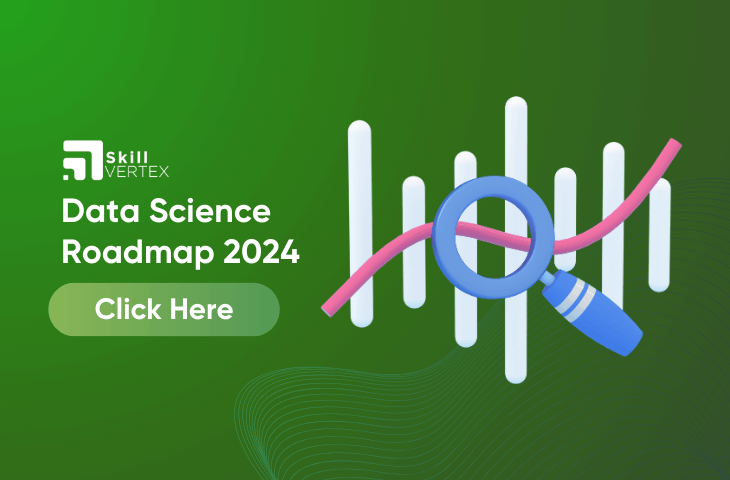Table of Contents
Data Science Road Map
Entering the world of data science in 2024 requires a clear plan to navigate the changing technology and analytics landscape. This guide is your roadmap, designed to help aspiring data scientists. From learning basics to embracing the latest technologies, join us on a journey to acquire the skills needed to succeed in the growing field of data science.
What is Data Science

Data science is a diverse field focused on using data to answer questions. It involves collecting, cleaning, and analyzing data through techniques from statistics, mathematics, and computer science. The process includes tasks like exploratory data analysis, feature engineering, model building, and deployment.
Data science is interdisciplinary, requiring collaboration across various domains. Its goal is to extract actionable insights and solve complex problems, adapting to evolving technologies and methodologies. Different interpretations and applications arise as individuals and organizations emphasize specific aspects based on their goals.
How do we learn Data Science?

Data scientists who belong to various educational backgrounds should be more proficient in the following
- Domain Knowledge
- Math Skills
- Computer Science
- Communication Skill
1. Domain Knowledge
If you like to become a Data Scientist in the banking sector and you are aware of the banking sector such as stock trading, finance, and, so this will be more useful for you, and therefore, banks will give more preference to such kinds of applicants.
2.Math Skills
Among maths skills, Linear Algebra, Multivariable Calculus, and Optimization Techniques are very necessary to understand machine learning algorithms. Machine Learning Algorithms play a vital role in data science. Whereas, understanding statistics is very important for Data Analysis. Probability is also important for statistics and is one of the requirements for learning machine learning.
3.Computer Science
The Computer Science skills required for the data science aspirants are:
- Basics of Data Structure and Algorithm
- SQL
- MongoDB
- Linux
- Git
- Distributed Computing
- Machine Learning and Deep Learning
4. Communication Skill
In data science, you need to talk and write about your findings. After you figure out what the data is telling you, you have to share it. This might mean writing a report for your boss or team, making a blog post, or doing a presentation for your colleagues. No matter what, you always have to tell others what you discovered in your data science project. So, being good at talking and writing is really important if you want to be a data scientist.
5. Learning Resources
There are several resources and videos available online for a beginner to learn.
Roadmap to Learn Data Science

To start your journey in Data Science, begin with an overview and read blogs on topics like Introduction to Data Science and career benefits. Build motivation by setting clear goals and regularly learning new concepts. Consider joining workshops or conferences for a deeper understanding. Stay consistent and gradually move towards your goal of building projects in Data Science.
1. Mathematics
A data Scientist should learn the topics given below
- Part 1:
- Linear Algebra
- Analytic Geometry
- Matrix
- Vector Calculus
- Optimization
- Part 2:
- Regression
- Dimensionality Reduction
- Density Estimation
- Classification
2. Probability
Probability is very essential for statistics and hence, it is one of the requirements for machine learning. A data scientist aspirant should know the topics listed below
- Introduction to Probability
- 1D Random Variable
- The function of One Random Variable
- Joint Probability Distribution
- Discrete Distribution
- Binomial (Python l R)
- Bernoulli
- Geometric etc
- Continuous Distribution
- Uniform
- Exponential
- Gamma
- Normal Distribution (Python)
3. Statistics
Knowing about statistics is very essential for the Data analysis. The key topics to master are the following:
- Introduction to Statistics
- Data Description
- Random Samples
- Sampling Distribution
- Parameter Estimation
- Hypotheses Testing (Python)
- ANOVA
- Reliability Engineering
- Stochastic Process
- Computer Simulation
- Design of Experiments
- Simple Linear Regression
- Correlation
- Multiple Regression (Python )
- Nonparametric Statistics
- Sign Test
- The Wilcoxon Signed- Rank Test (R)
- The Wilcoxon Rank Sum Test
- The Kruskal – Wallis Test (R)
- Statistical Quality Control
- Basics of Graphs
4. Programming
One should be aware of the programming concepts such as Data Structures and Algorithms. The programming languages required are Python, R, Java, and Scala.
5. Machine Learning
Machine learning is very essential for data science and is one of the main areas of research. One has to be aware of the basic algorithms for the Supervised and Unsupervised Learning. Moreover, there are many libraries in Python and R for functioning these algorithms.
6. Deep Learning
Deep learning will use TensorFlow and Keras inorder to structure and train the neural networks for structured data. Those networks are
- Artificial Neural Network
- Convolutional Neural Network
- Recurrent Neural Network
- TensorFlow
- Keras
- PyTorch
- A Single Neuron
- Deep Neural Network
- Stochastic Gradient Descent
- Overfitting and Underfitting
- Dropout Batch Normalization
- Binary Classification
7. Feature Engineering
Feature Engineering has found a productive way to improve your models.
- Baseline Model
- Categorical Encodings
- Feature Generation
- Feature Selection
8. Natural Language Processing
It is required to classify yourself to work with the data
- Text Classification
- Word Vectors
9. Data Visualization Tools
You have to create good data visualizations. The tools for the data visualization are the follows:
- Excel VBA
- BI (Business Intelligence):
- Tableau
- Power BI
- Qlik View
- Qlik Sense
10. Deployment
Whether you’re a fresher or have 5+ or 10+ years of experience, the final step in a data science project is deployment. It’s a crucial phase that showcases your effort and work. You have to master the platform given below
- Microsoft Azure
- Heroku
- Google Cloud Platform
- Flask
- Django
11. Continue Practicing
Eligibility Of Data Science
Anyone interested in learning Data Science can opt to enroll in a data science course, whether you are a newcomer or a professional. Engineers, Marketing Professionals, Software, and IT professionals can study Data Science. For regular courses in Data Science, basic high school-level subjects are the minimum requirement.
Conclusion
In conclusion, the data science journey for 2024 involves exploring key concepts through blogs and research, staying motivated, setting clear goals, and regularly learning new skills. The process consists of the crucial step of deploying your knowledge, and showcasing your dedication and hard work, regardless of your level of experience.
Data Science Road Map- FAQs
Q1. Is data science a good career in 2024?
Ans. As we enter 2024, the demand for data science is anticipated to rise significantly. Various industries recognize that data science is crucial for their future success, leading to a surge in job opportunities and increased earning potential.
Q2. What is the future of data science in 2025?
Ans. In 2025, a huge amount of data—463 exabytes per day, like 212,765,957 DVDs—is expected, according to the World Economic Forum. Cloud computing helps data scientists handle this massive data by providing necessary computing resources.
Q3. Will AI replace data analysts?
Ans. AI has the potential to augment, not replace, the role of data analysts. With automation handling routine data tasks, analysts can focus on more strategic work. However, it’s important to note that AI is not responsible for its errors.
Hello, I’m Hridhya Manoj. I’m passionate about technology and its ever-evolving landscape. With a deep love for writing and a curious mind, I enjoy translating complex concepts into understandable, engaging content. Let’s explore the world of tech together

